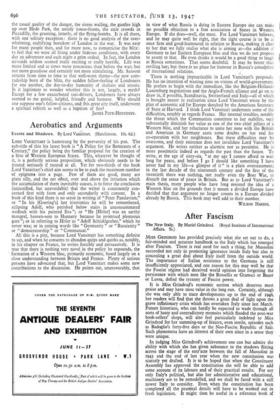Aerobatics and Arguments
Events and Shadows. By Lord Vansittart. (Hutchinson. 10s. 6d.)
LORD VAtisrrrART is hamstrung by the perversity of his pen. The sub-title of this his latest book is "A Policy for the Remnants of a Century," the policy being the familiar proposal for the creation of a bloc of Western European States. This, whatever be thought of it, is a perfectly serious proposition, which obviously needs to be treated seriously if treated at all. Yet for two-thirds of the book Lord Vansittart's chief aim seems to be to pack the maximum number of epigrams into a page. Few of them are good, many are plain silly, and the net effect, over and above the irritation which the accumulation of them inevitably causes, is to force the conclusion (unjustified, but unavoidable) that the writer is consistently con- cerned first with form and only secondarily with content. In a book of this kind there is no sense in writing of " Peter Panslavism," or " In his [Goering's] last histrionics he will be remembered, eclipsing Adolf, who perished below stairs in unconsummated wedlock with his painted Eva "; or " He [Hitler] was an earthy mongrel, heaven-sent to Hunnery because he promised plenteous gore "; or in referring to Hitler as "Adolf Schicklgruber," which he never was; or in coining words like " Germanity " or " Russianity " or " democratorship " or " Communazi."
All this is a pity, because Lord Vansittart has something definite to say, and when he consents to abandon quips and quirks as, notably, in his chapter on France, he writes forcibly and persuasively. It is true that there is nothing very novel in the policy he expounds, the formation of a Western bloc, primarily economic, based largely on a close understanding between Britain and France. Plenty of serious persons have advocated that, but Lord Vansittart makes some new contributions to the discussion. He points out, unanswerably, that in view of what Russia is doing in Eastern Europe she can make no possible objection to a free association of States in Western Europe. If she does—well, she must. For Lord Vansittart believes, and he may quite well be right, that the right course is to be at once firm and good-humoured in relation to Russia, making it clear to her that we fully realise what she is aiming at—the addition of Germany to her Eastern European bloc and that we do not propose to assent to that. He even thinks it would be a good thing to laugh at Russia sometimes. That seems doubtful. It may be better than reviling her; but there as no place for humour in Russia's conception of international relations.
There is nothing impracticable in Lord Vansittart's proposals. He has no intention of wasting time on visions of world-government. He prefers to begin with the immediate, like the Belgium-Holland- Luxemburg negotiations and the Anglo-French alliance and go on to draw in, if possible, Scandinavia, Switzerland and Italy—all of which is brought nearer to realisation since Lord Vansittart wrote by the plan of economic aid for Europe sketched by the American Secretary of State at Harvard. I think Lord Vansittart underrates some of the difficulties, notably as regards France. Her internal troubles, notably the threat which the Communists constitute to her stability, very substantially diminish her value as one of the two chief pillars of a Western bloc, and her reluctance to unite her zone with the British and American in Germany casts some doubts on her zeal for co-operation with her neighbours. But these difficulties may be overcome, and their existence does not invalidate Lord Vansittart's argument. He writes neither as alarmist nor as pessimist. He is more pessimistic indeed as regards the past than the future. To write, at the age of sixty-six, " at my age I cannot afford to wait long for peace, and before I go I should like something I have never had in my life—a glimpse of it " is a plain overstatement; in the last decade of the nineteenth century and the first of the twentieth there was nothing, not really even the Boer War, to disturb the sense of peace in Britain. But as to Lord Vansittart's main thesis, many people who have long resisted the idea of a Western bloc on the grounds that it meant a divided Europe have decided that that argument no longer counts in a Europe divided already by Russia. This book may well add to their number.
WILSON HARRIS.


































 Previous page
Previous page